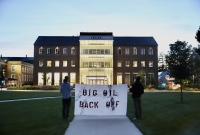Support strong Canadian climate journalism for 2025
Michelle Marcus braved the chilly rain to stand outside the University of British Columbia’s Alumni Centre on Tuesday hoping to convince students to move their money from the Royal Bank of Canada (RBC) into a credit union.
RBC, which is a major fossil fuel financier and backs contentious pipeline projects, has locations or ATMs on 25 Canadian university campuses. Similar actions by student activists were taken Tuesday at seven campuses.
Marcus, who is an organizer for the environmental group Change Course and a University of British Columbia alumna, and three students set up a table just around the corner from the bank’s on-campus location to explain to students why they should move their money and demand RBC leave university grounds or divest from fossil fuels.
“We think that this is not in the student's interest," Marcus said. "It's not something that the student union should be supporting, either.”
At the University of British Columbia’s Okanagan campus, students set up a model pipeline and hung banners calling for RBC to leave the campus. Students at Simon Fraser University dressed up in Halloween costumes to stage a similar action. In Ontario, students also co-ordinated action at Lakehead University, University of Toronto, University of Ottawa and University of Guelph.
In an email to Canada’s National Observer, an RBC spokesperson said the bank answers to its clients and partners.
"When it comes to climate change, we strongly believe that more action and at a faster pace is needed to address it,” the spokesperson said. “We are also working to engage with Indigenous communities in collectively advancing reconciliation.”
Last year, RBC invested more money into the fossil fuel sector than almost any other bank in the world, second to JPMorgan Chase. It financed the contentious Trans Mountain pipeline expansion project and the Coastal GasLink pipeline, which crosses Wet’suwet’en territory without the nation’s consent. Bank leadership shirked Wet’suwet’en hereditary chiefs' requests to meet at its past two shareholder meetings.
Marcus said RBC’s presence on campus suggests it supports the interests of students.
“We're trying to let students know that RBC is actually not there for them because they're the biggest funder of fossil fuels, not just in Canada, but in the world,” Marcus said. “There are better places for people to put their money, and if students come together, we believe that we can make a change.”
Vedin Schimmack, a second-year student at the University of British Columbia, suggests students switch to a credit union, where clients have a vote in how the institution invests its money.
“Big banks first and foremost care about the shareholders,” Schimmack said. “They don't care about you. They care about the people that have billions of dollars.”
The co-ordinated protest is not the first time Canadian university students have stood against RBC on campuses. As first reported by The Varsity, in March, more than a dozen students occupied the bank’s location at the University of Toronto campus to demand the school cut ties with the bank. The location is still open.
On Tuesday, University of Toronto students and members of student group Climate Justice University of Toronto gathered to paint a mural on the pavement outside the school’s library. Once again, they demanded the bank leave campus.
“We want RBC off our campus,” said Anaum Sajanlal, a second-year student, noting the bank’s investment in fossil fuel companies and its rocky relationship with the Wet’suwet’en hereditary chiefs.
“We don't want any of that on our campus. We don't support any of that,” Sajanlal said. “We're trying to send them the message that we don't want them here. They're not welcome here.”
This article has been updated to reflect that of all the banks in the world, last year, RBC invested the second-most money in the fossil fuel sector. A previous version of this article stated that last year, RBC invested the most money into the fossil fuel sector of any bank in the world. The figure was based on the 2022 Banking on Climate Chaos report, which has since been updated to reflect that JPMorgan Chase invested more money into the fossil fuel sector than RBC in 2022.






Comments
Thanks Michelle - and Issac for the story. This is incredibly important - we should all be enraged with RBC.